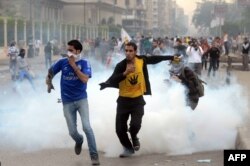An Egyptian court has sentenced 75 people to death, including several prominent Muslim Brotherhood leaders, and 47 other people to life in prison, over the bloody dispersal of two Muslim Brotherhood sit-in camps in 2013. The sentence, however, is not final and is expected to be appealed.
There was little suspense in the courtroom as the verdicts were handed down, because it was clear to observers that the sentences were not final and will no doubt be appealed.
Human rights groups, including Amnesty International, condemned the trial, calling it "disgraceful," and against the country's constitution.
Hussein Baoumi, who is based in Tunisia and covers Egypt for Amnesty, told VOA that the trials were not carried out fairly and clear evidence was not presented against individuals for the crimes with which they were charged.
"The trial has been generally unfair and when you look at the death sentences, they were convicted of the killings of a number of people from the security forces during the dispersal [of the sit-in camps], but when you look at the case files [themselves], they don't point to someone saying that [a specific] person killed [another specific] person. It doesn't identify the point where the criminal action took place," Baoumi said.
Amnesty also criticizes the Egyptian government for not holding anyone from the country's security forces responsible for the close to 900 deaths at the camps. Egypt's parliament passed a law earlier this year exonerating the military and police for actions during the 2013 protests in the Rabaa and al-Nahda areas of Cairo.
Said Sadek, who teaches political sociology, told VOA that the government insists that security force members were attacked and killed by protesters first, and security forces were deemed to be acting in self-defense.
Sadek believes that it is unlikely that death sentences will be carried out in the recent series of mass trials and that the government is holding them mostly as part of its anti-terrorism strategy.
"Egypt, like many countries, when they fight terrorism usually adopt three steps: one is to eliminate the leadership, either by imprisonment or exile; the second strategy is to cut the [groups'] finances, and this has been taking place by confiscating and suspending any company that used to provide money for the Muslim Brotherhood [protests]; third strategy is to criminalize membership in any of those terrorist organizations," Sadek said.
Many observers who were following the case of prominent photo-journalist Mahmoud Abou Zeid, known to the media as Shawkan, were relieved to learn that he was given a fairly light five-year sentence and is likely to be freed for time served.
Hundreds of people were arrested after Egyptian security forces stormed two Muslim Brotherhood sit-in camps in August 2013, several months after the military ousted Islamist president Mohamed Morsi after weeks of protests against him.









